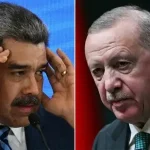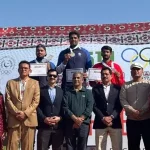Indian Occupied Kashmir – The Indian government has offered amnesty to first-time stone-throwers in Indian-occupied Kashmir, a move legal experts dismissed as meaningless since most of the accused were “framed” in multiple cases.
Lawyers for the pro-independence protesters in Kashmir say this would provide little relief to those who are facing jail for mostly minor offences committed in a period following the first wave of unrest in 2008.
“This announcement of amnesty is a drama,” Shafaqat Hussain, a lawyer who has been fighting human rights cases in Kashmir for two decades, told Al Jazeera.
“I have handled thousands of such cases, and in my experience, most of these young people have been booked in multiple cases in multiple police stations. Even minors are not spared, they have been booked in many cases,” he said.
Hussain said that in most instances, the state fails to provide evidence and the court “honourably acquits these youngsters but it ruins their life because it takes years of trials in the court”.
“They already suffer the punishment,” he said, adding that these people are not able to get passports or jobs in government departments.
Lawyer Mir Urfi, who has argued hundreds of such cases in court, said that people charged in cases in 2010 – when the second civilian unrest led to a lengthy shutdown and protests – have already faced six to seven years of court proceedings.
“Who will compensate their years? At the end they are being acquitted by the court,” she said. “Only people who have been booked in 2015, 2016 will benefit, but among them, no case has been withdrawn so far.”
Urfi said that she had seen many cases where people are given amnesty from legal procedures, but they continue to face “unofficial harassment” from the police.
“When there is a strike call, these people are called to police stations a night before. If there is an amnesty in a real sense, then all this harassment should end, which will help the young people lead a normal life,” she said.
Pro-freedom leader Syed Ali Geelani called the amnesty “a mere political stunt”.
“In a bid to label those pursuing freedom as stone throwers, the authorities in New Delhi and their puppets in the state were annoyed and dejected when people vehemently took to the streets to protest against the forced occupation from 2008 to 2016,” Geelani said in a statement on Saturday.
Fifteen-year-old Yaseen, a resident of Kashmir’s main city, Srinagar, was charged in a stone-throwing case last year. His cousin, Ali, said that the government has “time and again made false promises”.
“He is facing a court trial, and he has been booked with seven charges. The police have no video or photo evidence against him, but he has been falsely implicated even though he is a minor,” Ali said. “His education has been impacted. He is not able to lead a normal life due to the mental trauma he is facing.”
Chief Minister of Jammu and Kashmir, Mehboooba Mufti, who announced the amnesty last week, said that it had been made on the recommendation of the New Delhi-appointed interlocutor, Dineshwar Sharma, a former intelligence chief who recently visited Kashmir for a dialogue with stakeholders in the region.
Sharma, who is currently on his second visit to Jammu and Kashmir, has been tasked with holding talks with Kashmiri leaders including separatists – a departure from the Modi government’s rigid policy in the past three years.
Indian Occupied Kashmir police chief Munir Khan told Al Jazeera that they had started the process of withdrawing cases against first-time offenders who were charged between 2010 and 2017, but he did not disclose how many cases are being withdrawn.
“The cases of students and other young men will be reviewed. The process will take another five to six days to complete,” Khan said.
Last year, the region was rocked by some of the most widespread civilian uprisings in the two decades of conflict following the martyrdom of rebel commander Burhan Wani.
In the crackdown that followed, more than 100 civilians were killed and hundreds were blinded by police who shot at the protesters with iron pellets. Several thousand civilians were charged, mostly for rioting.
Civilian uprisings have become the main feature of the conflict in the past decade as rebel groups, which have been active since 1989, have declined in strength.
The rebels are fighting for the Indian occupied portion of Kashmir to either become independent or merge with Pakistan. India maintains more than half a million soldiers in the territory.
Before last year’s unrest, amnesty for stone-throwers was announced after the 2010 uprising by the then-government in the disputed region. But human rights defender Khurram Parvez said that it was not implemented, either.
“How can we trust the amnesty announced by the government. A similar amnesty was announced by the state in 2011, but nothing was done on the ground. We have not seen any cases being withdrawn. There are people as old as 70 who have been booked in stone-throwing cases; this means nothing,” Parvez said.
Dr Radha Kumar, an Indian academic and author who was appointed as an interlocutor to Kashmir in 2011 by the Congress-led government in New Delhi, described the amnesty as a “much-needed step” and said it needs to be taken forward in shape of a political dialogue.
“If we don’t take the step towards political dialogue, there is high risk that the violence will start again; political problems need to be acknowledged. Lessons need to be learned from past experiences in Kashmir,” Kumar told Al Jazeera.





